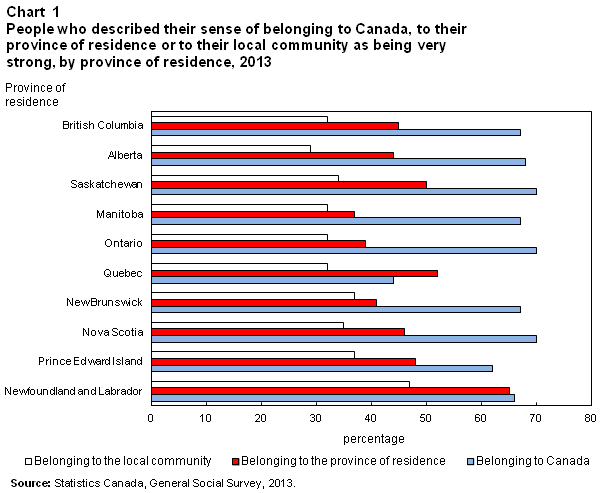Publications
Spotlight on Canadians: Results from the General Social Survey
Sense of belonging to Canada, the province of residence and the local community
Sense of belonging to Canada, the province of residence and the local community
Archived Content
Information identified as archived is provided for reference, research or recordkeeping purposes. It is not subject to the Government of Canada Web Standards and has not been altered or updated since it was archived. Please "contact us" to request a format other than those available.

The 2013 General Social Survey on Social Identity asked Canadians aged 15 years and older to describe their sense of belonging to Canada, their province of residence and their local community.Note 1 Those born outside Canada were also asked to describe their sense of belonging to their country of origin.
In 2013, almost two in three people (63%) reported having a very strong sense of belonging to Canada. Just under half (45%) said they had a very strong sense of belonging to their province of residence, and nearly one in three (32%) expressed that same sense of belonging to their local community.
The sense of belonging tended to be stronger among women and older people.
In 2013, 77% of seniors aged 75 years and older expressed a very strong sense of belonging to Canada, compared to 56% of young people between the ages of 15 and 24 (Table 1).
In addition, 64% of women expressed that sense of belonging to Canada, compared to 62% of men.
Regional variations in sense of belonging
In 2013, among the 10 provinces, Nova Scotia, Ontario and Saskatchewan residents were the most likely to report a very strong sense of belonging to Canada (70% each), while Quebec residents were the least likely (44%) (Chart 1).

Sense of belonging to the province of residence also varied regionally, with residents of Newfoundland and Labrador (65%) and Quebec (52%) being most likely to have a very strong sense of belonging to their province.
Residents of Newfoundland and Labrador also ranked the highest in their sense of belonging to their local community (47%), while Albertans ranked the lowest (29%).
Immigrant status and sense of belonging
Immigrants were more likely than non-immigrants to report having a very strong sense of belonging to Canada (67% versus 62%).
However, this difference was not evident for all age groups. For example, among youth aged 15 to 24, there was no observed difference between the non-immigrant and immigrant populations (Chart 2). Conversely, among seniors aged 65 to 74, 80% of immigrants expressed a very strong sense of belonging to Canada, compared with 73% of non-immigrants.

In 2013, longer-term immigrants, that is, those who immigrated before 2000, were more likely to express a very strong sense of belonging to Canada (71%) than to their country of origin (29%).
This difference was less pronounced among immigrants who immigrated between 2000 and 2013, with 60% of them expressing a very strong sense of belonging to Canada and 44% having a strong connection to their country of origin.
Table 1
People who described their sense of belonging to Canada, to their province of residence and to their local community as being very strong, 2013
| Very strong sense of belonging to Canada | Very strong sense of belonging to the province of residence | Very strong sense of belonging to the local community | |
|---|---|---|---|
| Percentage | |||
| Total | 63 | 45 | 32 |
| Men (ref.) | 62 | 43 | 30 |
| Women | 64Note * | 46Note * | 34Note * |
| Age group | |||
| 15 to 24 years | 56Note * | 40 | 29 |
| 25 to 34 years | 55Note * | 37Note * | 25Note * |
| 35 to 44 years (ref.) | 60 | 40 | 29 |
| 45 to 54 years | 63Note * | 44Note * | 32Note * |
| 55 to 64 years | 68Note * | 50Note * | 34Note * |
| 65 to 74 years | 74Note * | 55Note * | 41Note * |
| 75 years and older | 77Note * | 57Note * | 43Note * |
| Province | |||
| Newfoundland and Labrador | 66Note * | 65Note * | 47Note * |
| Prince Edward Island | 62Note * | 48Note * | 37 |
| Nova Scotia | 70 | 46Note * | 35 |
| New Brunswick | 67 | 41 | 37Note * |
| Quebec | 44Note * | 52Note * | 32 |
| Ontario (ref.) | 70 | 39 | 32 |
| Manitoba | 67 | 37 | 32 |
| Saskatchewan | 70 | 50Note * | 34 |
| Alberta | 68 | 44Note * | 29Note * |
| British Columbia | 67 | 45Note * | 32 |
|
|||
Note
- Date modified:
